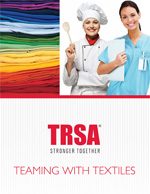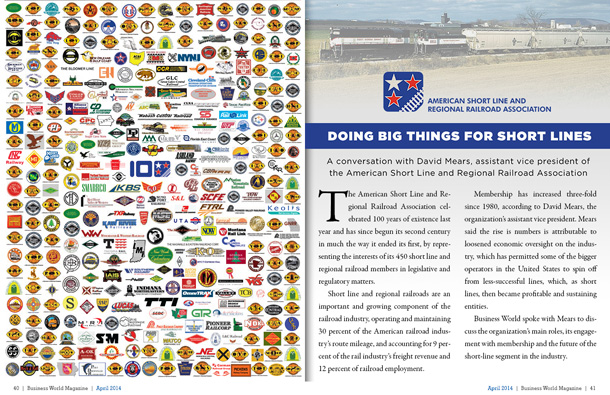Teaming with Textiles
Â

In an esteemed series of essays, Historian Thomas Carlyle wrote that without clothes there would be neither politeness, nor polity, nor police; he said all “society is founded upon cloth.” Textiles may, indeed, represent the one industrial product with which we come in direct contact every single day, but as much as these goods figure in the fabric of our personal lives, they also function in the fulfilling of professional duties, from the fire-resistant fabrics serving firefighters to antimicrobial materials used in healthcare, and more. For more than a century, one national association has served to support the innovations, safety and sustainability that so succinctly complements quality coming from the textiles industry.
When reaching for a napkin at a restaurant, or when grabbing a towel to wipe our hand after working on the car engine, or when simply putting on that uniform that we may wear to work; the ability to so readily access that seemingly simple piece of textile product may allow one to take for granted the science, the engineering, the manufacturers and suppliers which all served to make that product available. What’s more, when that product needs to be cleaned, whether it is the towel or bed linen at a hotel or a hospital, we may not always consider the innovations of engineering, chemical formulations and wondrous workforce that toils to ensure that product is not only clean, but safe for use. Textile services impact every single one us and from the manufacturing, supplying and cleaning of service-sector uniforms and garments to restaurant supplies and hospital linens, it’s an industry that that has produced hundreds of thousands jobs. This industry supplies uniforms to more than 20 million U.S. workers in all industries as well as linens and towels to hundreds of thousands of healthcare and hospitality facilities.
Over the last hundred years, the Textile Rental Services Association (TRSA) has served by providing advocacy, research, education and communications, as well as by creating the professional certification standards, which all collectively contributes to the operational productivity, safety and sustainability of the textiles industry. The TRSA’s origins date back to 1912 when the Ohio Board of Health passed such restricting regulations on rental towels, it threatened to wipe away much of the workforce in the linen supply industry. Industry operators banded together to create what was then known as the Ohio Linen Supply Association. Over the next few years, this group attracted such interest and support from professionals throughout the country that it soon transitioned into a nationally-focused organization known as the Linen Supply Association of America. Many changes would take place over the next few years, from operational advances that saw operators transition to truck and rail delivery systems as opposed to horse-drawn buggies; issues arising from the unionizing of workers and legislative policies. At the same time, there were advances in mechanical systems and industry itself which put additional demands on manufacturers, suppliers and laundry processors. Through it all, operators understood that by working together, they could more effectively grow and capitalize on information sharing, research and training in what was rapidly evolving into a highly specialized industry. In 1979, in recognition of the many launderers that specialized in heavy industry cleaning services, the LSAA rebranded once more to become the Textile Rental Service Association.
TRSA has evolved into an international organization that represents companies who supply the laundered garments, uniforms, linens, floor mats, towels and other products necessary for their customers to respectively operate safe, clean facilities. TRSA companies are not only specialists in providing and managing the supply of quality textile goods directly to business locations, but are also experts in determining the most hygienic and cost-effective laundering solutions for a variety of workplaces, from small medical practices serving only a few patients to stadiums that accommodate more than 100,000 spectators. From hospitality and healthcare, to retail, manufacturing and automotive services, these industries are among the most dependent on textile rental services. TRSA’s membership comprises almost 90 percent of the entire textile services market, from national chain stores and single-plant operators to those who provide the products, machinery, supplies and services required by industry.
Support and Services
TRSA CEO Joseph Ricci provides an overview of the range of services the association fulfills on behalf of its membership. These include facilitating the sharing of information and best practices through conferences, trade publications, industry events and online resources. TRSA additionally conducts research and benchmarking initiatives that help improve productivity, core competencies and customer service. And in terms of its role in legislative advocacy, the TRSA strives to protect the integrity and market opportunities for textile services by advocating for fair, balanced and pro-business regulations and taxation. Such advocacy is particularly essential because as Ricci says, “Most people have never stepped once into a commercial laundry to witness how it operates. Most don’t have a clue about the safety standards and sustainability practices that operators adhere to, or the amount of people that depend on the jobs this industry provides.†Therefore, to Ricci’s point, when regulatory or legislative policies are introduced, there may not be proper understanding as to how such policies will impact the industry and its workers, such was the case when TRSA came into its very existence.
Nearly one third of TRSA’s budget is dedicated to monitoring, tracking, reporting, responding and proactively advocating regulatory and legislative initiatives. Ricci says TRSA is busy tackling several legislative priorities. In one case, he says the association is striving to ensure commercial laundry business can remain competitive in the market place. Ricci cites an incident involving a laundry which was going to have to lay off a number of workers after losing significant business to a competing force, in this case, the inmates of a prison system. The TRSA is working for adoption of measures that will prevent state prisons from competing against commercial companies whose workforce could be similarly impacted.
Other initiatives have involved union organizing. For example, under current law, employers can prevent unions from organizing their workplaces unless a secret-ballot takes place. The rules governing these elections are meant to ensure neither side has unfair influence on the outcome. Various versions of the Employee Free Choice Act (EFCA) submitted in recent years have attempted to change the rules to favor unions. EFCA has been temporarily stopped; most recently, through a binding-arbitration measure that was included in the Protecting America’s Workers Act whose passage has been slowed by Congress. Through its Senate liaison, Ricci says TRSA helped sideline EFCA, yet the association continues to remain wary of loopholes in current law that encourages unfair organizing practices.
The Safe Chemical Act is another concern of the TRSA. Under this Senate legislation, every textile rental services plant could be recognized as a “processor†of chemicals simply because it uses detergent. TRSA has opposed this because member companies would now be required to provide their customer lists to government authorities, eliminating business confidentiality of highly valuable proprietary information. Ricci says this scenario could materialize as this bill and a House companion measure are absorbed into reform of the Toxic Substances Control Act.
Certified Safe & Sustainable
Among TRSA’s greatest triumphs been realized from working closely with members and federal agencies to improve employee safety and implement sustainability practices which have significantly contributed to the conservation of water and energy, but also lessened impact on the environment. On the safety front, Ricci explains how a little more than five years ago, following an accident at a plant, the association established a safety training program called “Safe TRSA.†Today, incidents involving safety deficiency have been reduced by more than 50 percent.
In another recent case, Ricci says concern had been prompted about certain “shop towels†used in factories. Basically, there was a question as to the safety of the cloths which collect dirt and other byproducts whenever a worker wiped his hands. The TRSA wanted to ensure that these towels were safe for use following processing from a laundry. It required elaborate testing by an independent authority, but following careful scrutiny, the towels were verified as clean and safe. The TRSA has been particularly dedicated to ensuring both the safety of workers in industry as well as the customers that are served by the industry.
Today, both workers and consumers have greater assurance through quality standards which have been embraced by the industry, and clearly distinguished by those who have complied with the rigorous requirements necessary to earn certification. TRSA has several programs which directly reflect an operator’s adherence to safety and sustainability practices. TRSA Clean Green Certification recognizes companies that demonstrate responsible leadership in sustainability and conservation to protect the environment. The program acknowledges a textile service company’s continuing commitment to improving efficiencies in water and energy conservation and adoption of best management practices for reusing, reclaiming and recycling resources. TRSA Hygienically Clean certification recognizes companies’ commitment to cleanliness through third-party, quantified biological testing and inspection. This process eliminates subjectivity by focusing on outcomes and results that verify textiles cleaned in these facilities meet appropriate hygienically clean standards and best management practices across all market segments. TRSA also provides means for one to earn distinction as a Certified Professional Laundry Manager (CPLM). The CPLM provides documented evidence of both expertise and experience, serving as a means to distinguish competent managers from less experienced peers.
The totality of these professional standards has resulted in greater productivity, operational efficiency and environmental stewardship throughout the textiles industry. Ricci says eco-sensitivity continues to be an important focus of the TRSA. The organization has worked closely with the Environmental Protection Agency in its drive for continuous improvement. Some years ago, there was concern about byproducts within water run-off, but the industry worked with the EPA to devise processes that filtered the water from such impact. Ricci says, in some cases, the industry even exceeds standards proposed by the EPA. One case involves the use of detergent additives known as Nonylphenol Ethoxylates (NPE). Ricci says this chemical may help make whites whiter and brights brighter, but may not be so good for marine ecosystems. Though NPEs have not been banned by the EPA, the textiles industry is working toward the elimination of this additive in liquid and powder detergents. “Our members have volunteered to phase this out of detergents … even though it isn’t outlawed, we’re taking it upon ourselves to do it, and we think of it as a win-win for the industry, for consumers and the EPA.â€
In terms of other environmental and sustainable practices, Ricci says the TRSA is helping study potential of alternative fuel in the industry. To that point, given the range of deliveries made by the textiles industry, TRSA members collectively deploy the nation’s third-largest fleet. The number of vehicles used to fulfill services ranks right up there with that required by FedEx or UPS. Ricci anticipates that the industry will transition to alternative fuel systems to mitigate escalating gas prices and further reduce impacts from fuel emissions. As Ricci says, “Our members want to operate as safely, environmentally-friendly and efficiently as they can … we’re helping to devise solutions which help make that possible … that way, when one gets the processes down, they can better focus on other important aspects of their business, such as safety or customer service,†says Ricci.
In terms of the future, Ricci says the TRSA will continue to form new collaborations and build upon its network of relationships to further expand on the services, advocacy and innovations unique to this industry. Ricci says the textiles industry is growing by branching into other area of services, and as that continues to play out, look to TRSA’s services and influence to grow too.
To learn more about the programs and events sponsored by TRSA, or processes involving certification, visit the association’s website at www.trsa.org.








